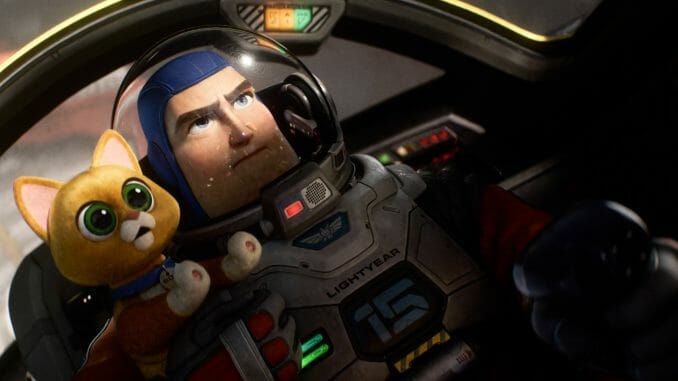Lightyear‘s Pulpy Sci-Fi Adventure Successfully Applies the Pixar Formula

Pixar’s trade is in time. Its hardest-hitting stories push kids, and the parents that take them to the movies, to consider our impermanence. To see the sand trickling down our hourglasses. Their signature bittersweetness slips through alongside the coarse grains. Whether we’re watching the birth and death of lifelong love (Up, Finding Nemo, Coco), seeing fulfillment slip between fingers (The Incredibles, Ratatouille, Soul) or putting away childish things (Inside Out, the Toy Story movies), we are beholden to Pixar’s brutal, confrontational chronology. Life is fleeting, even when that life belongs to a drawstring cowboy doll or a rat chef-puppeteer. Time keeps on slippin’, slippin’, slippin’—now, it’s the future. The solo directorial debut of longtime Pixar animator Angus MacLane (he co-helmed Finding Dory with Andrew Stanton), Lightyear teleports this surefire poignancy into a pulpy sci-fi adventure. Its strapping hero flies full speed ahead when confronting the passage of time, accelerating to an enjoyable but decidedly finite success.
Opening text sets the tone and clears up the confusion of Lightyear’s own IP-forward making: This is the in-universe film that served as inspiration for Toy Story’s Buzz Lightyear figure. Got it? No? This time he’s supposed to be a guy, made of hair and skin and bravado, instead of a toy made of plastic, electronics and bravado. Beyond that initial bit of corporate absurdity, Lightyear is, for the most part, easy to wrap your head around. It doesn’t give you time to mull its meta-premise over: We crash-land straight into Star Command’s Buzz (Chris Evans) and his BFF/commander Alisha Hawthorne (Uzo Aduba) exploring an uninhabitable alien world.
They’re vine-cutting, insect-blasting throwbacks to huckster magazine covers; Amazing Stories, Startling Stories, Thrilling Wonder Stories already supplied all the adjectives I could ever need. The 105-minute movie zips at the same clip as a flashlight-lit, under-the-covers page-turner. Buzz, Alisha and their ship’s populous human payload are soon stranded through Buzz’s own doing, his myopic pride wrecking one engine and inspiring the pursuit of another’s solution. He needs to get to hyperspeed, but each attempt confronts him with an accelerated, genre-fied version of Pixar’s bread and butter: A four-minute spaceflight to the limits of speed is four years planet-side.
Buzz’s repeated attempts and failures thrill as we quickly grok the montage’s implications: As he fails, obsessed with single-handedly fixing his mistake and returning to the status quo, those around him keep on living. His frustrations stay fixed, his friends move forward. Alisha ages, finding a wife, having kids and then a granddaughter, Izzy (Keke Palmer). Buzz clings to fading hope. Classic Pixar, reminding us that we’re all going to die. More than that, reminding us how easy it is to fritter away our fleeting time here. Its kiddie memento mori sells the complex emotional and temporal situation Buzz finds himself in, though the inner feelings of the space ranger remain at a karate-chopping arm’s length.
The perfectionist super-ranger (suffering, one imagines, from time dilation-induced PTSD) must learn to take life as it comes…nearly a century after he helped strand everyone on this alien world. MacLane and co-writer Jason Headley make this harrowing mission more palatable and trenchant through Lightyear’s focus on teamwork. To that end, Buzz’s team is essential. A grown-up Izzy, quick-to-quit Mo (Taika Waititi) and geriatric parolee Darby (Dale Soules) are the requisite ragtag rookies to check Buzz’s arrogance. The unlikely group of amiable screw-ups must save the planet’s human population and the aimless soul of one Standard-Issue White Male Hero.
To that end, Evans is good at what he needs to do, which is pretty much what he needed to do as Captain America: Be an uppity stick-in-the-mud hero the others can play off of. Buzz is historically a stodgy doofus, though this iteration lacks a maddened Tom Hanks to bring him back to reality. Instead he has a few undercooked yet harmless companions in Izzy, who gets a little “living up to your family” arc, and the simple goofballs Mo and Darby. Buzz isn’t the most interesting guy and his arc is fully telegraphed, so you wish those surrounding him completely benefitted from some of the story’s more community-minded moments, but the performers acquit themselves well even when the movie flicks on the autopilot.
-

-

-

-

-

-

-

-

-

-

-

-

-

-

-

-

-

-

-

-

-

-

-

-

-

-

-

-

-

-

-

-

-

-

-

-

-

-

-

-








































